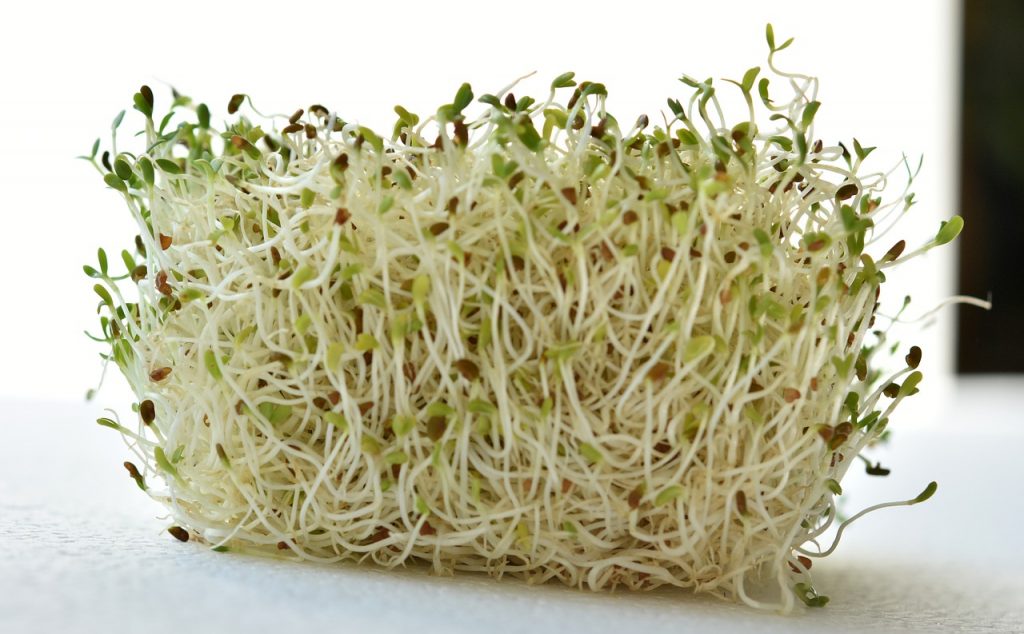Known for its nutritional and medicinal value, the herb alfalfa may have some health benefits.

Alfalfa is a plant used for both animal and human consumption. Alfalfa may possess some health benefits, thanks to mechanisms that include:
- Antioxidant activity. Alfalfa contains a wide variety of plant compounds that have antioxidant properties.
- Reduced inflammation. Alfalfa has been shown to reduce the levels of pro-inflammatory molecules.
- Reduced cholesterol absorption. Alfalfa extract supplementation has been shown to reduce cholesterol absorption.
- Supplying nutrients. Alfalfa is rich in vitamins and other nutrients.
Overview
Alfalfa (Medicago sativa), also known as lucerne, is a flowering plant used as forage for cattle and horses. Alfalfa is also utilized for human consumption; its young sprouts are popular in salads in sandwiches. In addition, alfalfa has some medical properties, and its powdered leaves and seeds are increasingly used in green food supplements.
Alfalfa is a rich source of nutrients, including protein (~15%), vitamins A, C, E, and K4, minerals calcium, potassium, phosphorous, and iron, fiber, and bio-active phytochemicals such as chlorophyll and saponins.
Like other greens grasses, alfalfa is advertised as a superfood that supports general health and helps make up for low vegetable & fruit intake. Some people also claim it might help with medical conditions such as arhritis, diabetes, and high cholesterol.

How Alfalfa Might Support Your Health
Antioxidant activity
Similar to most green food supplements, alfalfa contains multiple compounds that have antioxidant properties, including vitamins, saponins, and isoflavonoids.1 Antioxidants can have many health benefits considering that oxidative stress is involved in a wide range of disorders and even the process of aging itself.
Suppressing proinflammatory cytokines
Cytokines are protein molecules that play a big role in the body’s immune and inflammation responses. Research suggests that some components of alfalfa, such as loliolide, reduce the release of cytokines that promote inflammation, such as IL-6 and IL-1β.
Lowering cholesterol
Multiple animal and a single human study have reported that alfalfa reduces blood levels of cholesterol, LDL (“bad’) cholesterol, and other related compounds. The mechanism responsible for this appears to be reduced absorption of dietary cholesterol in the intestines, particularly through the activity of saponins found in alfalfa.2
Alfalfa Uses & Potential Benefits
As a greens supplement, alfalfa is most commonly taken to support overall health or help with specific conditions. For example, many people take alfalfa to help with arthritis, digestion, asthma, diabetes, blood pressure problems, and other disorders.
Although these uses remain largely untested, research has shown that alfalfa has multiple mechanisms of action – including the lowering of fat absorption and antioxidant activity – which might add up to these and other health benefits.
Research
Animal Research
Alfalfa and its constituents have seen a good deal of examination in animals, which suggests a number of beneficial properties.
Polysavone in alfalfa may improve immunity and reduce fat gain
This study examined the effect of polysavone, a compound extracted from alfalfa, on fat deposition and immunity in broiler chickens. The animals were fed either a normal control diet, or one supplemented with 0.06% polysavone. The study found that the polysavone group gained less fat and had improved immunity as shown by increased proliferation of lymphocyte cells.
- The researchers concluded that ” polysavone may decrease abdominal fat deposition and enhance immunity…”3
Alfalfa may suppress inflammation
This study looked at the anti-inflammatory effects of alfalfa sprout ethyl acetate extract (ASEA). The extract was shown to suppress certain cytokines (molecules controlling inflammation and immune response) in isolated cells and in live mice that were injected with lipopolysaccharide to promote inflammation.
- The researchers concluded that “ASEA supplementation can suppress the production of pro-inflammatory cytokines and alleviate acute inflammatory hazards“4
Alfalfa might reduce cholesterol absorption
This study examined the effect of alfalfa saponins on cholesterol absorption in mice. The supplementation was found to reduce absorption of cholesterol in the intestine.
- The researchers concluded that “Alfalfa top saponins (nonhydrolyzed) reduced absorption of cholesterol“5
Alfalfa extract appears to have antioxidant and liver-protective effects
For this study, researchers examined the antioxidant and liver-protective effects of alfalfa extract. Using a mouse model of oxidative stress and liver damage, they discovered that alfalfa supplementation ameliorated liver lesions and displayed moderate antioxidant activity.
- The researchers concluded that “alfalfa extract possesses hepatoprotective and antioxidative stress properties…”6
Human Research
Alfalfa has yet to be thoroughly tested in human trials.
Alfalfa might help with high cholesterol
In this study, fifteen people with hyperlipoproteinemia were given alfalfa seeds for 8 weeks. The treatment resulted in significantly lower blood cholesterol, LDL cholesterol, and apolipoprotein levels, indicating a positive effect on elevated blood lipids.
- The researchers concluded that “alfalfa seeds can be added to the diet to help normalize serum cholesterol concentrations…”7
Alfalfa Dosage
- A dose of 5 – 10 g has been used for reducing elevated cholesterol
- Single-ingredient alfalfa supplements suggest taking 3.6 – 10 grams daily as capsules/tablets or a powder mixed in a drink
- Multi-ingredient supplements typically mix alfalfa with wheat and barley grass and other greens ingredients
Supplements in Review Says
- Alfalfa leaf powder 4 – 10 g daily.
Alfalfa is full of greens nutrients and phytochemicals that can improve your health in multiple ways. Research suggests that alfalfa can be used to increase your intake of plant-based compounds that have effects including antioxidant activity, cholesterol reduction, improved immunity, and suppression of inflammation.
Given the lack of human studies, it’s best to stick to supplement dosages. Most supplements use the leaves of alfalfa and recommend taking 4 – 10 g daily.
Leave a Reply